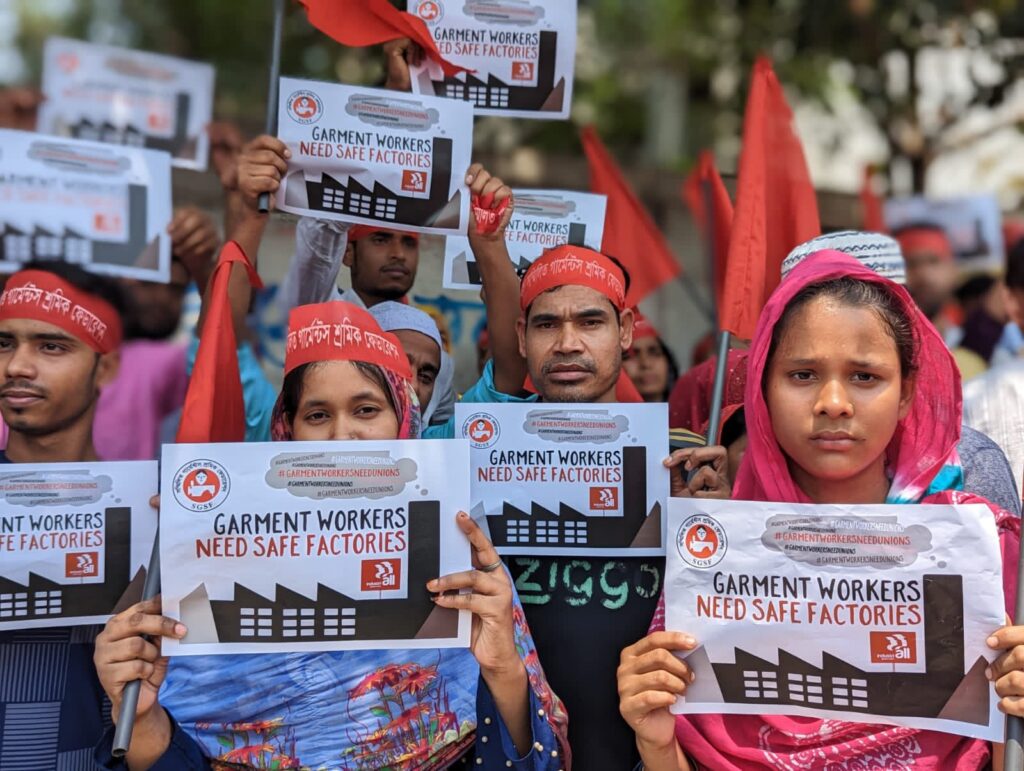20 April, 2023On the tenth anniversary of the Rana Plaza factory collapse, the deadliest disaster in the history of the garment industry, IndustriALL Global Union and UNI Global Union are calling on garment and textile brands to sign the International Accord to safeguard worker safety in Bangladesh, Pakistan and beyond.
More than a thousand workers were killed and over 2,500 injured when the eight-storey Rana Plaza building on the outskirts of the Bangladeshi capital Dhaka collapsed on 24 April 2013. Deep structural cracks were discovered in the building, which housed factories making clothes for global brands, the day before the tragedy. However, garment workers were told to enter the factory complex the next morning or lose their jobs, despite their concerns over the building’s stability.
Ten years on, workers in Accord factories in Bangladesh are undeniably safer. The legally binding Accord, orchestrated by IndustriALL and UNI in 2013 and signed with global brands and retailers, has since transformed factory safety in Bangladesh’s garment industry, given workers the right to refuse unsafe work, saved lives, supported freedom of association and increased collective bargaining.
Currently 194 brands and retailers are signed on to the Accord, covering around 2.4 million workers in Bangladesh, and 46 brands and retailers – and counting – have so far signed the Pakistan Accord, which will include 750,000 workers in that country once the inspection programme is implemented.
However, there are notable exceptions of brands who must take greater responsibility for worker safety in their supply chain – particularly U.S. companies like Levi’s, Gap, Walmart and Amazon who have refused to sign the Accord. The sign-on of brands like these will protect more garment and textile workers from dangerous conditions and will strengthen the push for the Accord’s renewal as it is set to expire in October 2023.
“Although significant progress in Bangladesh’s garment industry has been made, safe factories still need to be fought for,”
says Atle Høie, IndustriALL general secretary.
“Workers who produce the clothes that we wear deserve a workplace that provides them with a living wage and decent working conditions, not a workplace that threatens to take their lives. More brands need to join the Accord, especially in North America, to gain the leverage we need to extend it to more countries and make it a truly global Accord.”
Says Christy Hoffman, UNI Global Union general secretary:
“On this solemn anniversary, we mourn for the lives lost and forever changed by the Rana Plaza tragedy, and we honour them by making sure that another disaster like this never happens again. The best way to do that is to expand the Accord’s work and number of brand signatories.
“The Accord has a proven track record of making work safer, which is more than we can say for corporate-backed audits. In fact, some brands like Walt Disney demand that their factories meet Accord standards, and yet they have not committed to supporting its implementation by signing the agreement.”
To date, there have been nearly 56,000 inspections safety inspections across over 2,400 garment factories in Bangladesh. More than 140,000 safety instances corrected, and the total remediation progress rate across the factories currently covered Accord is 91 per cent.
- The Accord for Fire and Building Safety in Bangladesh was initially signed on 15 May 2013 between UNI Global Union, IndustriALL Global Union, eight Bangladeshi trade unions and 40 brands. More than 220 global brands and retailers had signed the Bangladesh Accord by 2018.
- To maintain and expand the Accord progress, over 190 brands and retailers signed the 2018 Accord on Fire and Building Safety in Bangladesh (Transition Accord) with UNI and IndustriALL on 1 June 2018.
- In May 2019, the Accord Steering Committee signed a Memorandum of Understanding with the Bangladesh Garment Manufacturers Association (BGMEA) in which it was agreed to establish a national, independent organization, the RMG Sustainability Council (RSC) to carry forward the workplace safety programmes of the Accord in Bangladesh.
- In 2021 the Accord signatories reached a new phase in their partnership and established the International Accord for Health and Safety in the Textile & Garment Industry (International Accord). This agreement came into effect on 1 September 2021 with 77 brand signatories. As of 20 April 2023, International Accord has 164 brands and retailers as signatories.
- The Pakistan Accord for Health and Safety in the Textile and Garment Industry (Pakistan Accord) between UNI, IndustriALL and brands and retailers was announced in December 2022, with the intention to begin implementation in 2023 in progressive phases over an initial period of three years. It currently has 46 signatories.

